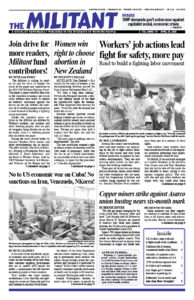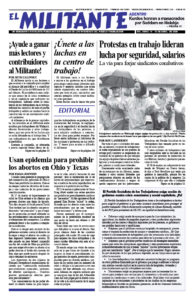The Cuban government continues to respond to any requests to send medical workers to countries around the world to combat the coronavirus epidemic. And Washington is stepping up its slander of the unstinting work of Cuba’s medical volunteers. It seeks to bury the truth about the working-class solidarity offered by Cuba’s revolutionary government — one the U.S. rulers have been determined to overthrow for decades.
In the past two weeks brigades of Cuban volunteer health workers have traveled to Italy and Andorra in Europe and to Grenada, Suriname, Jamaica, Belize, Antigua and Barbuda, Saint Vincent and the Grenadines, Dominica, and Saint Lucia.
The State Department urged the governments in these countries to “scrutinize agreements” with the Cuban government, baselessly charging Havana is guilty of “labor abuses” of its doctors.
Additional medical personnel have also gone to reinforce thousands of Cuban doctors and nurses already in Venezuela, and those in Nicaragua.
Even media usually partisan to Washington’s propaganda against the Cuban Revolution have noted its internationalist missions. CNN pointed to “Cuba’s growing contributions to the battle against the pandemic.” But the liberal outlet tries to explain Cuba’s “extremely effective … disaster relief” not as a product of the revolutionary transformation of its people, instead crediting the country’s “hyper centralization” of government.
In fact, the response of the Cuban government to the coronavirus pandemic is a result of the transformation of millions of working people in the course of a revolutionary struggle. Fidel Castro and the July 26 Movement led workers and farmers to overthrow U.S.-backed dictator Fulgencio Batista in 1959 and go on to bring down capitalist rule and establish their own government.
Ernesto Che Guevara, a leader of the revolution who had trained as a doctor, told medical students in Cuba in August 1960 how he was won to revolutionary struggle. He explained that he had joined with others to oppose the CIA’s operation to overthrow the government of Jacobo Arbenz in Guatemala in 1954. Then “I realized a fundamental thing. To be a revolutionary doctor,” Guevara said, “there must first be a revolution.”
In the course of the revolutionary war in areas liberated from Batista’s forces, workers and farmers were organized by the Rebel Army to take control of land reform, education, justice and health care. They established clinics and field hospitals treating combatants, including Batista’s wounded soldiers, as well as peasants.
The foundation of the health care that exists in Cuba today and the internationalism of the 28,000 medical volunteers it has serving around the world is a product of what was conquered in the course of that struggle. This cannot be inserted into other nations whose social relations reflect the immorality of capitalist exploitation.
“Have the people of this country made a revolution because that’s just the way they are?” Guevara asked an international volunteer work brigade in 1960. “Absolutely not,” he said. “The people are the way they are because they are in the midst of a revolution.”
Cuban doctors arriving in Antigua March 26 “have a lot of experience working in many other countries,” explained Maria Cabreja, Cuba’s ambassador. The 31 volunteer medics arriving there will work at a center being reorganized for use as a quarantine and isolation facility.
“Maybe their English is not perfect but they can understand. But better than that they have the sensibility and the desire to help people and that’s the most important thing and that’s why I am so proud of them,” Cabreja added.
Dr. Yalier López arrived with other volunteers to reinforce the Cuban medical mission in Venezuela March 17. He told Cuba Sí that they had undergone vital preparatory training to combat epidemics before leaving the island. “This is another mission for the revolution,” he said, “and to me, it’s an honor to be one of the doctors chosen to bring this to fruition.”
Many of the Cuban doctors and nurses joining these internationalist missions to fight coronavirus had previous experience on missions working with others to push back the Ebola virus in West Africa.
“Medical personnel who will go anywhere to save lives, even at the risk of losing their own, are the greatest example of solidarity a human being can offer, above all because they aren’t motivated by material interest,” Fidel Castro explained in 2014.

